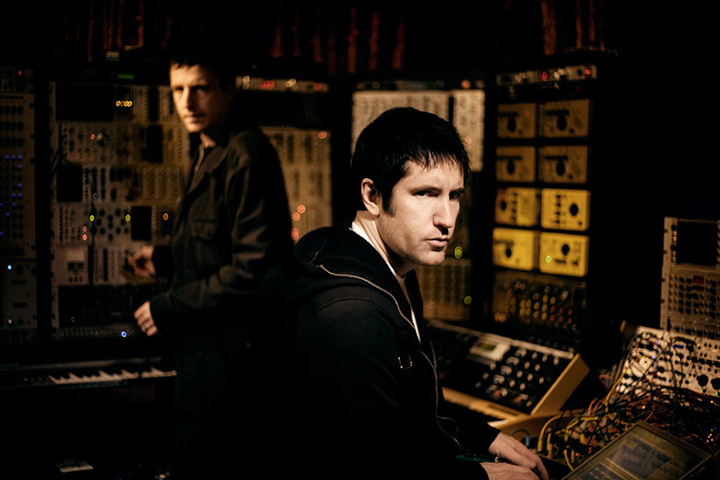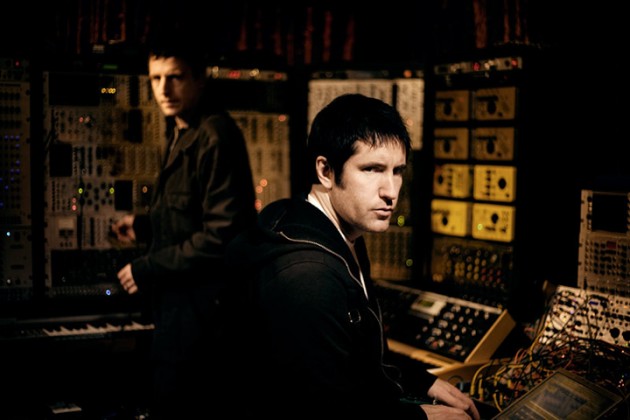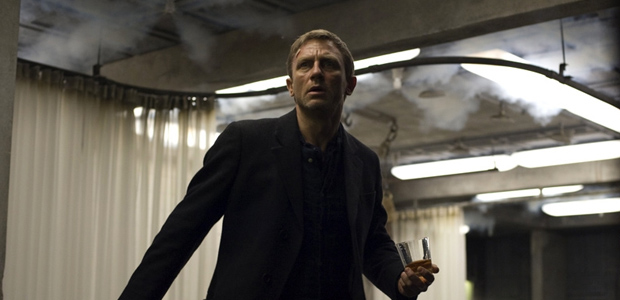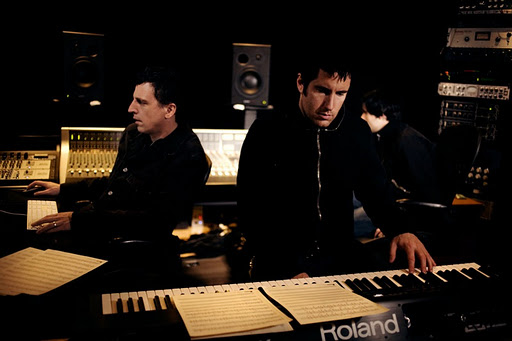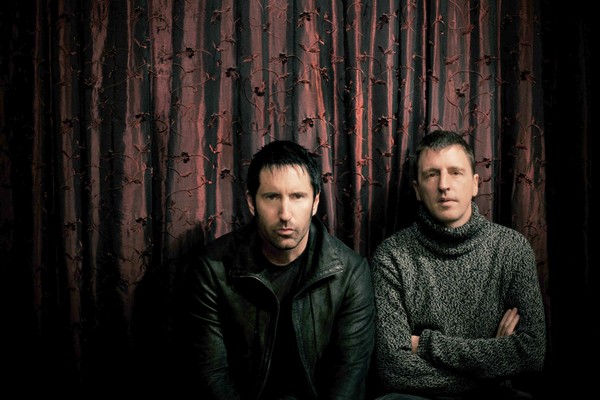Earlier this year, musician Trent Reznor and composer Atticus Ross rightfully received an Academy Award for their original score for The Social Network. Their collaboration gave the film a propulsive feel, helping the drama move as quick as its protagonist acts and talks. Their music perfectly contributed to the film’s tone and atmosphere. With The Girl with the Dragon Tattoo, Reznor and Ross once again collaborate with director David Fincher for a much different and much bigger film.
Reznor and Ross’ score is epic, soon available on a 3-disc set and currently available online. Even while listening to the score separate from the film, the tension and mood it creates is clear. Like The Social Network, it’s a score that works wonders as a standalone piece.
Here’s what artist Reznor had to say about the long process of scoring Dragon Tattoo, the respect and meticulousness of Fincher, and determining success and failure:
I’m guessing you’ve seen the film a hundred times about now?
I’ve seen it a few times, yeah.
Does it stay exciting or does it get a little tiring?
[Laughs] I mean, we worked on this for so long there was a time where it was really impossible to maintain any objectivity. It really wasn’t until I got to see the almost, almost, almost finished version up at Skywalker a couple of weeks ago, I gotta admit that was the first time – and I had seen it assembled many times – but to see it with another layer of polish, the right audio mix and the right space, I got that charge like I had never seen it before. It was a nice experience.
The album itself is epic and quite lengthy. When you took this on, did you know what kind of undertaking it was going to be?
Well, Atticus and I made the conscious decision to really leave this last entire year open for this project, not take on any other work, and not try to spread ourselves too thin, because we assumed it could branch out and seemed like there was a lot of stuff we had to do. Going into it with that kind of mindset, it wasn’t a surprise when we really got into it and saw we had a lot of ground to cover. It was a fun experience, and an in-depth and detailed one. It’s nice coming down and seeing the end of the tunnel now, since we’re proud about it.
You mentioned how it was tough maintaining objectivity. When you do lose objectivity, what does that do to the process?
We started off thinking, ‘Let’s just stay very abstract and very impressionistic,’ and when we didn’t even have the script. I had read the book and spoke, in detail, with David [Fincher] about the kinds of soundscapes, emotions and what not, then we just blindly composed for six weeks this time last year. We composed music we felt might belong, and then we’d run it by Fincher, to see where his head’s at and he responded positively. He was filming at this time last year and assembling rough edits of scenes to see what it feels like, and he was inserting our music at that point, rather than using temp music, which is how it usually takes place, apparently. Getting into this year, when we finally started seeing scenes and digging into the sequence of shots, where we’re seeing things out of context and out of continuity, so it gets pretty hard, especially for a film this long. You try to remember, “Oh wait, this comes after those ten things and comes before that,” so we have to be considering of that and the mood we’re trying conjure up.
So the difficulty was finding the structure of the score?
Yeah, we weren’t working on a finished thing, so everything keeps moving around, scenes are changing in length, and even the order of things are shuffled around, and that can get pretty frustrating when you get precious about your work. It was a lesson we learned pretty quickly of, “Everything is in flux, and approach it as such. Hopefully it’ll work out in the end.”
Was it a much different process from The Social Network? I believe you came on after it was shot.
We officially came on after it was shot, and it was pretty much edited to recognizable form. You could watch it, and it flowed like a film. We knew what we were up against at that point. There was a structure, and that structure didn’t really change. Things got a bit polished, but there wasn’t kind of a real – we knew the scenes that were going to be in the film, that kind of thought. With this one, it was much of things in play, a longer movie, and much more to consider.
Working on another score obviously means you had a good experience with The Social Network. On an artistic level, what did you find satisfying about scoring that film?
It forced me to compose in a way I had never thought about. It forced me to work for a different purpose and master. You know, if I’m working on my own music, I’m hoping that’s 100% of your attention. In the role of film composer, I realize I’m working on what’s best for the picture and helping realize David’s vision, and that was a refreshing change. I didn’t look at any of that as a series of restrictions, it was more like an interesting exercise and an interesting process. I think the key to that working was a mutual respect between David and I, which we very much have. And it was fun; it was fun not being the boss for a change and fun getting into his head, and helping him realize what he saw and heard there. The same thing followed over to this film, to a more extreme degree. We were much more involved in the process on this one.
Does going off of someone else’s vision versus creating your own make the process — I hate to say easier, but is it?
I wouldn’t say easier, it’s different. Usually when I’m working on a piece of music, I would think generally, as opposed to, say, Paul McCartney or a real traditional songwriter who starts with a melody, words, and then arranges it in a certain fashion. A lot of times I find inspiration from the arrangement of the texture or the setting. What I’ll do, if I’m composing for Nine Inch Nails or How to Destroy Angels, is visualize something – a place, a feeling, an emotion, or some scenario like that. I’ll start to try to see what it sounds like, to get a feeling evoked, and then insert a melody and lyrics inside that frame. So this process wasn’t radically different from that, except I’m being told what the scenario is, rather than conjuring up. The pro of that is, “Oh, I can literally see what I need to make come to life.” In my world, if that scenario kind of sucks, I can throw it out and conjure up a new one [Laughs].
[Laughs] Your writing process, I’m guessing, would be similar to working on this film, since the film relies heavily on atmosphere.
Yeah. I started off thinking… you know, my fear with The Social Network was: How the hell do I score that? [Laughs] When I’m looking for inspiration, I’m usually not conjuring up entitled assholes arguing about shit in courtrooms. I thought when The Girl with the Dragon Tattoo came up, I thought, “Great, I see landscapes, terrible scenarios, and stuff I can understand.” You realize once you get that out of your system, in the first ten percent of the process, you think, “Now what?” It’s not really about the icy landscapes, it’s about what these characters our feeling, and what we’re implying they’re feeling and getting into their minds. It was a much more difficult — and maybe just because it was a longer process — than dealing with The Social Network. I think we had so much opportunities and time, we backed ourselves into corners quite often.
When you get into one of those corners, what do you do?
When you look at some of our composer brethren, who do six or seven films a year, I envy that, in some ways. In some ways, I’m mystified at how you can do that, and do that with depth. I don’t think I could do that. If I had to, I think I could come up with something. We really became this film. We lived with it, thought about it, overthought about it, woke up thinking about it, and dreamt thinking about it. We kind of inhabited these characters, and composed fully involved in that. Having the time to realize when something isn’t the right direction, we’d have time to fix it. That was comforting. Also, we’re new to this, the whole world of film scoring. We really didn’t want to fuck this up, so we gave ourselves time to fix things.
I was surprised to hear you say what you thought about writing The Social Network, and not the part of not thinking about entitled assholes arguing. I’m betting you could relate to what it’s about: the process of creating and the pitfalls of ambition.
You’re right, that’s what the movie is about. I think my first fear was, ‘Oh shit, I’m not seeing dragons slaying and serial killers. What is the sound of, you know, what I described earlier.’ On the surface, it felt like that. It was the first panic moment of, ‘What’s the music going to sound like?’ It wasn’t obvious, but I quickly realized what the film is about isn’t the setting, it’s about exactly what you pointed out, which I do have a lot to relate to. I could empathize with the characters in that film, in a lot of ways.

